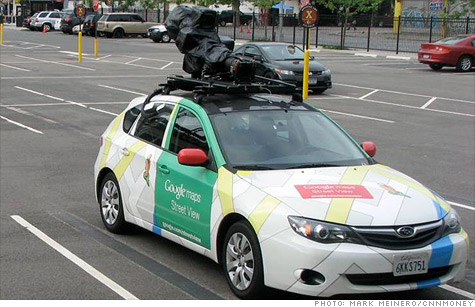Search News

Google is still dealing with the fallout from its Street View cars' accidental collection of personal data transmitted over unencrypted Wi-Fi.
NEW YORK (CNNMoney) -- Google intentionally hindered a federal regulator's probe into its Street View cars' accidental grabs of personal information off of Wi-Fi routers, according to the investigating agency.
Google's penalty: A measly $25,000 fine.
The Federal Communications Commission said in a report filed late Friday that Google repeatedly gave the agency the cold shoulder when it was trying to determine whether Google had engaged in any wrongdoing.
Google admitted in late 2010 that it had inadvertently collected unsuspecting people's information.
Prying out more detail proved exceedingly difficult for the FCC.
Google "deliberately impeded and delayed" the investigation by failing to respond to information requests, the agency said.
It added: "Google apparently willfully and repeatedly violated Commission orders to produce certain information and documents that the Commission required for its investigation."
The debacle came to light in mid-2010, when Google revealed that its data-collection cars had mistakenly downloaded so-called "payload data" (snippets of information sent over the Internet) from Internet users who were logged on to unprotected wireless networks in range of its cars. That data could include e-mails, instant messages, usernames and passwords.
Google (GOOG, Fortune 500) apologized for the gaffe and said it never used the personal information it collected. The company also said it deleted the information.
In its report, the FCC said it tried to gather information to determine whether Google violated any of the agency's provisions.
In its initial response to the FCC's inquiry, Google provided just five documents, including a copy of its software code that was so poorly documented that the FCC said it was "impossible to know where the redactions occurred."
Google initially refused to send the FCC its internal e-mails about the issue, despite repeated requests for them. The company also refused to name the engineers involved in the collection and review of the data gathered from Wi-Fi routers. Doing so would "serve no useful purpose," Google claimed.
The FCC, which called Google's actions "inappropriate," sounded exasperated about Google's many failures to respond to its requests.
The FCC had to try for nine months to get an appropriate person simply to sign off on Google's statements to the agency. It took five letters and a threat to "compel compliance" with a subpoena to get all of the documents it initially asked for.
After it finally got the engineers' names, the regulator delivered a subpoena to the software engineer who developed the code that was used to download the information from the Wi-Fi routers. He invoked his Fifth Amendment right to avoid self-incrimination. As a result, the regulator said "significant factual questions ... cannot be answered."
Because of all the hoops Google made the FCC jump through, the agency hit the company with the maximum penalty available, a $25,000 fine.
That fine was solely for Google's failures to respond to the agency's inquiries. In the end, the FCC said it could not find sufficient evidence that the company actually violated any of its statutes.
Google said it objects to the FCC's ruling.
"We provided all the materials the regulators felt they needed to conclude their investigation and we were not found to have violated any laws," a Google spokeswoman said in an e-mailed statement. "We disagree with the FCC's characterization of our cooperation in their investigation and will be filing a response."
The FCC's fine is pocket change for Google, which just reported a nearly $3 billion quarterly profit. If every Google employee kicked in 75 cents, that would cover the fine. Google's highest paid employee, Chief Financial Officer Patrick Pichette, earned more than $25,000 every 10 hours in 2011.
The FCC is the second U.S. regulator to probe Google for its Street View data collection oopsie. The Federal Trade Commission closed its investigation of the issue in October 2010 without taking any action against Google.
In November, Google implemented a way for people to opt-out of having their routers surveyed at all. ![]()